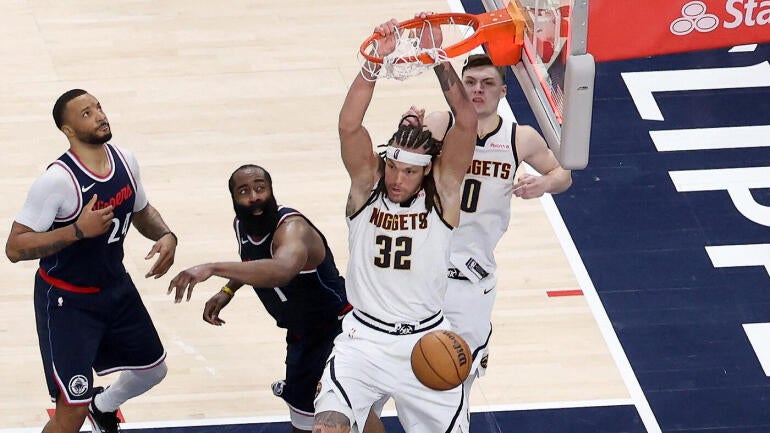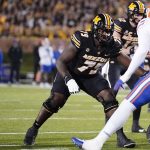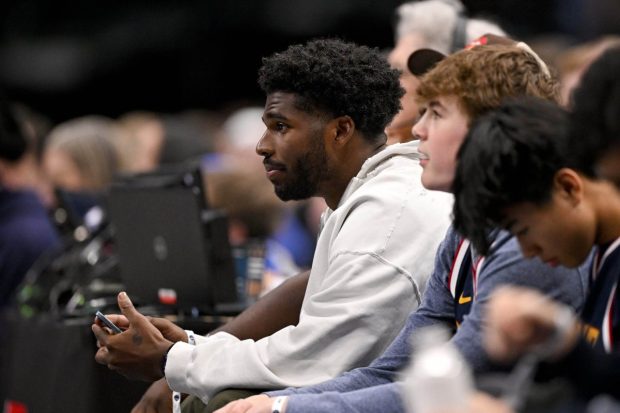

Oh you thought Russell Westbrook winning the Denver Nuggets Game 1 at the 3-point line was crazy? You were awed by Kawhi Leonard’s historic shotmaking in Game 2 as the Los Angeles Clippers tied the series? Turns out, those were just the appetizers.
The main course of one of the greatest first-round matchups in NBA history was served on Saturday as the Nuggets, down 2-1 in the series and in desperate need of a momentum shift, pulled off perhaps the most stunning victory of the season behind Aaron Gordon’s buzzer-beating dunk (the first in playoff history, according to ESPN) in Game 4.
That victory shouldn’t have been especially stunning. Denver led by 22, 87-65, early in the fourth quarter. Only 18 teams in NBA history have ever blown a 22-point lead of any kind in the playoffs, a number that shrinks precipitously if you only count leads in the fourth quarter. Yet roughly 10 minutes after trailing 87-65, the Clippers led, 97-96. Were it not for some Nikola Jokić heroics in the final minute, Gordon’s miracle wouldn’t have even been possible.
So let’s take a deep breath, folks. Now that the chaos has unfolded, let’s look back on what exactly happened here. How did the Clippers nearly steal this game? And how did Gordon ultimately save it?
An exhausting risk
The Nuggets actually managed to sneak a solid four minutes and 28 seconds of rest in for Jokić in the second quarter. They were able to do it because, in a pretty rare event for the postseason, their bench actually managed to hold up. Jokić left the game with a five-point lead. He returned to it with a three-point lead. Not bad. With such a lengthy break survived in the first half, interim coach David Adelman elected to keep Jokić on the floor for the rest of the game. He played the last 31 minutes and 32 seconds with only a halftime break.
Adelman deployed the same strategy in Game 2. Jokić sat for nearly five minutes in the second quarter. A six-point lead fell only to a three-point lead. He finished the game from there. The difference, though, was that the Clippers led Game 2 by two points when Jokić would have typically taken his fourth-quarter break. Adelman likely felt that removing Jokić at that point would have led to the lead widening significantly, so he couldn’t take the risk. Jokić visibly struggled with exhaustion as the game progressed. He missed four huge second-half free throws, for example, in a game that was ultimately decided by three points. The decision was defensible in the moment, but signs of the danger involved were apparent.
The big difference on Saturday was that the Nuggets led by 20 at the beginning of the fourth quarter. The same degree of risk wasn’t apparent. Had the Clippers quickly gotten out to, say, a 6-0 run, Adelman could have quickly subbed a somewhat rested Jokić back into the game. The hope was likely to put the game away quickly so Jokić could come out for good after only a few minutes, but by keeping Jokić out there for the entire second half, he was less able to affect the game when the lead did start slipping away. Jokić scored with 11:12 remaining in the fourth quarter. He did not score again until the final minute, despite Denver’s clear desperation for someone, anyone to generate good offense. Of course, the Clippers played their part in slowing the Nuggets down as well.
A bold defense
The Clippers practically never play zone defense. According to Synergy Sports, they did so on just 22 possessions throughout the entire regular season. That makes sense. Why would you need to run a gimmick defense when you ranked No. 3 for the season? The Clippers have so many and such a wide variety of defensive stars that resorting to a zone never seemed necessary. They have the answer for almost every offense in the form of a single, high-end defender. Case in point: Until a stretch in the third quarter, the Clippers have mostly gotten away with letting Ivica Zubac defend Jokić straight up.
But switching to a zone made sense for two key reasons. The first is timing. This is an Erik Spoelstra staple: If you unleash a zone defense in the middle of a playoff game, you don’t give your opponent a chance to study it or prepare ahead of time. These are high-level professional players. They’ll figure it out with enough reps. But seeing any unusual defense in real-time can short-circuit even the best offenses for brief stretches. Anthony Edwards noted this after Game 2 of the Lakers-Timberwolves series. It’s a common mid-series curveball that works really well in the moment and then needs to be adjusted afterward so offenses can’t get used to it.
The second was specific to the Nuggets. Shooting is the ultimate zone-buster. The Nuggets attempted the fewest 3-pointers in the NBA because their roster is filled with iffy shooters. Denver is good at almost everything offensively. They ranked in the 90th percentile league-wide in terms of efficiency, according to Synergy. The half-court offense was in the 83rd, the after-timeout offense and the against-man offense ranked in the 87th, and the against-press offense ranked in the 97th.
But their offense against zones? It ranked in the 37th percentile. This is one of Denver’s primary offensive weaknesses, and the Clippers have been saving their secret weapon for just the right occasion.
So what did this zone look like? It was a rare 1-1-3 formation. One defender, usually Kawhi Leonard, pressured the ball up top. A second defender, usually Bogdan Bogdanović, defended at the next level, ready to make an aggressive play on the ball-handler or to slide over to make it harder for Jokić to get the ball. The three remaining defenders covered the back line. Ivica Zubac defended the rim. James Harden and Norman Powell crept in towards the middle of the floor, ready to use their quick hands to strip and deflect the ball.
According to Synergy, the Clippers ran five zone defense possessions against the Nuggets in the fourth quarter. Denver scored on none of them. That zone seemingly caused quite a bit of confusion for the Nuggets, who spent the entire fourth quarter dribbling hesitantly and throwing the ball all over the gym. Their inconsistent jump-shooters missed, and with nothing available at the rim with three defenders crowding it, the Nuggets stalled. It was only through Jokić’s individual heroics that they managed to score the three critical points they needed in the final minute just to get to 99 and ensure overtime. Those last two points, however, belonged to Gordon.
A perfect storm
Common protocol on an inbound with a game-tying or game-winning shot potentially coming is to switch everything. The idea is that these plays are meant to be quick-hitters, so it’s acceptable to concede a mismatch on a low-percentage jumper. The Clippers didn’t do that, though, because conceding a mismatch with eight seconds remaining and the play designed to give Jokić the ball on the perimeter would have just been too dangerous.
Instead, everybody stuck with their man through the initial action. Only when the seconds started to tick away did Leonard creep off of Jamal Murray and rush to help on Jokić. He did this feeling reasonably confident that Jokić did not have the time or space to make a clean pass to Murray, and he was correct. Jokić forced up a shot.
However, Leonard’s decision to double impacted everyone else on defense. Bogdanović had to step up above the nail just in case Jokić did attempt the Murray pass so he could try to intercept it. Harden’s eyes were, correctly, on the ball. He therefore saw what was happening ahead of him, and knew that he had to try to box out Bogdanović’s man, Christian Braun,, because Bogdanović himself was otherwise occupied.
This left Harden’s man, Aaron Gordon, totally unaccounted for. He had crept down a bit lower than the typical dunker’s spot, giving him space to build momentum if nobody boxed him out. That allowed him to step into his jump and launch off of both feet a split-second faster than everyone in front of him, who were all so fixated on the shot that they were a half-beat late to the rebound. Therefore, nobody could contest him, Gordon caught the ball easily, and the rest is history.
If this ball hits the rim, we’re going to overtime. If the Clippers had switched, Jokić attacks the mismatch (which would have been on Harden), the Clippers probably double, and someone else has a game-winning shot attempt. If Leonard doesn’t double, perhaps the Clippers are in a better rebounding position because Bogdanović could have been involved in the play. The stars aligned absolutely perfectly for Gordon to dunk this ball, but he also read it perfectly and made one of the greatest game-winning plays in NBA history.
This news was originally published on this post .









Be the first to leave a comment